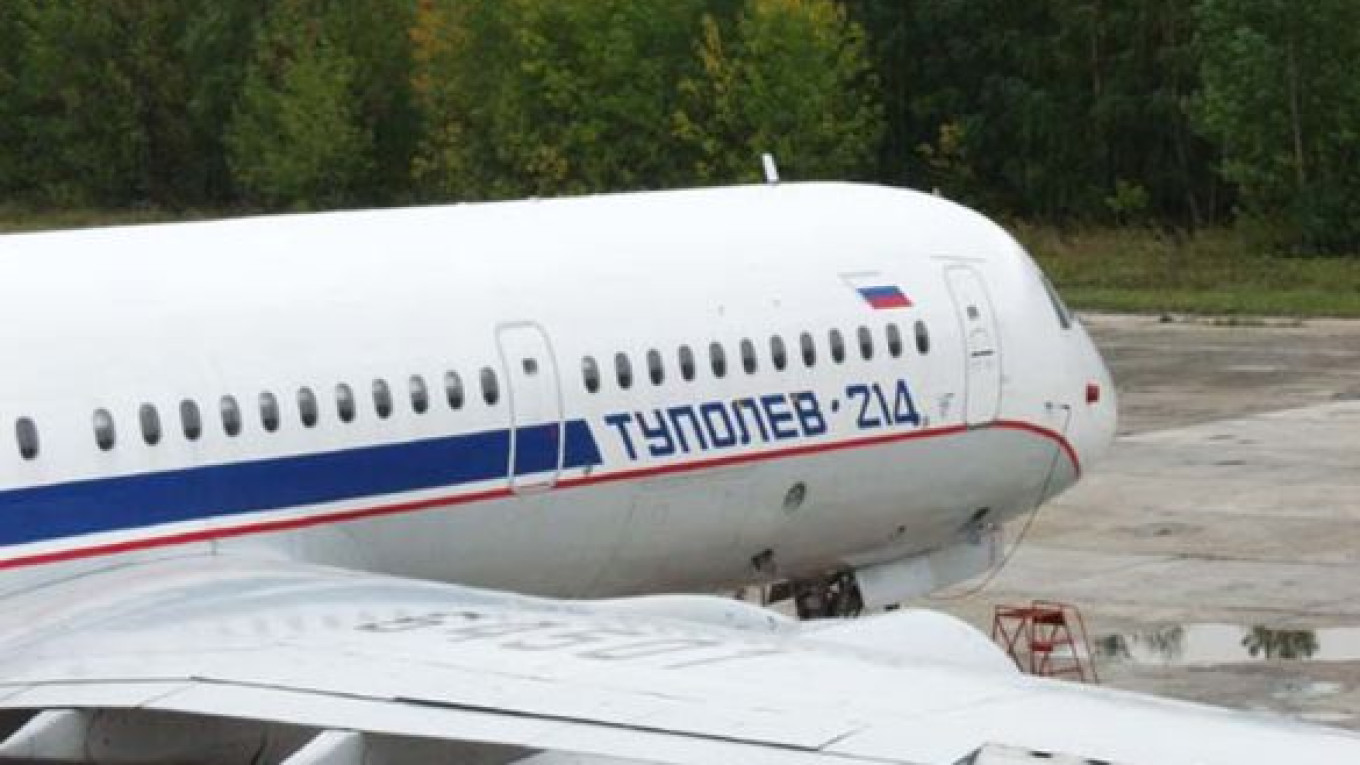President Dmitry Medvedev on Friday promised the biggest tranche of government spending on the aviation industry since the fall of the Soviet Union — and then told Russia's aviation firms to "work harder instead of begging for money."
The contradictory comments came as Medvedev gave a withering assessment of the state of domestic air transport and called for a root and branch refit of the industry.
"In order to change the situation, the plan is to allocate more than five trillion rubles [$176 billion] from the budget for aviation operations before 2020. That is actually 10 times more than during the past decade," the president said at an expanded Security Council meeting, according to a transcript on the Kremlin web site.
The tranche will include more than 470 billion rubles to be spent on modernizing Russia's crumbling civilian airports and creating a unified air-traffic control system, Medvedev said.
Projects will start this year with work at airports in Moscow, Sochi, Vladivostok, Kazan and the Kuril Islands, the president said.
He also proposed the creation of a state-owned airline to serve "socially important" but unprofitable routes neglected by commercial airlines, so that people don't find themselves "flying from Krasnoyarsk to Novosibirsk via Moscow."
Medvedev estimated some 40 percent of civilian airports have gone out of service in the past decade, primarily because of neglect and poor infrastructure.
"For us air travel is not a luxury, as it is in some European countries where a car can get somewhere faster than a plane. It is an urgent need," he said.
But the much-needed investment came with a blistering attack on the stricken industry and the quality of Russian-made aircraft.
"We only produced seven commercial airliners in 2010. It's a very dull figure," he told the Security Council on Friday.
And while he called on Russian airlines to buy domestically produced aircraft, he said they couldn't be expected to buy "any old plane" and told aircraft builders not expect sales if they would not compete with Western models in price and quality.
"Russian planes should not be inferior in noise pollution, fuel efficiency or range, not to mention electronics," Medvedev said. "Unfortunately even our new aircraft have problems in these areas, as I recently learned from my own experience."
He did not elaborate, but news agencies reported Friday that a presidential Tupolev Tu-214 had been found unfit for service and returned to the manufacturer after suffering repeated problems with its landing gear.
Interfax reported that the Kremlin has recently acquired a French-made Falcon jet and placed an order for two Airbus A319.
If true, that would be in line with market trends. Tupolev and Illyushin sales have plummeted as airlines have increasingly opted for newer and more reliable Airbus and Boeing models.
Accepting it is in no position to challenge the dominance of Boeing and Airbus in the long-range passenger market, Russia has pinned its hopes in the civilian sector on the Sukhoi Superjet 100, a medium-range twin-engine jet liner that can seat 98 passengers.
Sukhoi hopes to use the Superjet to compete with Canada's Bombadier and Brazil's Embraer in the "regional" airline segment.
The aircraft has received favorable reviews from test pilots, but production delays still plague the project.
Aeroflot will finally put its first Superjets into service on its Moscow-Nizhny Novgorod flight as of May 15 — three years after it was meant to receive first deliveries.
In December, Italian flag-carrier Alitalia dropped Sukhoi from a possible $500 million order for the planes, saying it could no longer wait for the Superjet. The Italian company went on to buy regional jets from Embraer instead.
Sukhoi Civilian Aircraft is planning to make 14 Superjet 100s this year, increasing to 25 in 2012 and later reaching an annual output of 60 to 70 airliners.
A Message from The Moscow Times:
Dear readers,
We are facing unprecedented challenges. Russia's Prosecutor General's Office has designated The Moscow Times as an "undesirable" organization, criminalizing our work and putting our staff at risk of prosecution. This follows our earlier unjust labeling as a "foreign agent."
These actions are direct attempts to silence independent journalism in Russia. The authorities claim our work "discredits the decisions of the Russian leadership." We see things differently: we strive to provide accurate, unbiased reporting on Russia.
We, the journalists of The Moscow Times, refuse to be silenced. But to continue our work, we need your help.
Your support, no matter how small, makes a world of difference. If you can, please support us monthly starting from just $2. It's quick to set up, and every contribution makes a significant impact.
By supporting The Moscow Times, you're defending open, independent journalism in the face of repression. Thank you for standing with us.
Remind me later.


